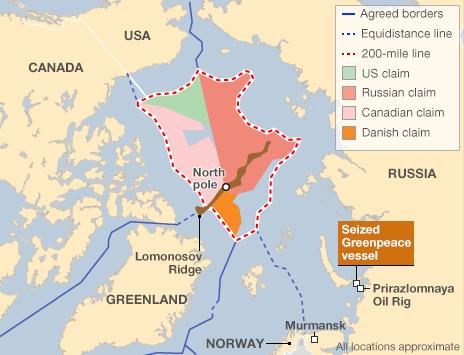Greenpeace to appeal over activists held in Russia
- Published
Watch footage of the activists trying to haul themselves on to the Gazprom oil platform
The environmental organisation Greenpeace is to appeal against the detention of 30 of its activists in Russia over a protest in the Arctic.
It demanded their immediate release, after a court in Murmansk remanded 22 of them in custody for two months pending an investigation.
Eight other activists face a new hearing on Sunday.
The crew of the Arctic Sunrise ship, who hail from 18 nations, are accused of "piracy" against an oil platform.
Activist Iain Rogers from Exeter in the UK accused the court of corruption
However, President Vladimir Putin has said the Greenpeace activists are clearly not pirates, though they may have broken international law.
Led by Captain Peter Henry Willcox, who previously commanded Greenpeace's Rainbow Warrior ship when it was blown up by French agents in a New Zealand port in 1985, the activists were protesting against the Arctic oil and gas industry.
Greenpeace says drilling for oil in the Arctic puts a delicate environment at risk.
Russian coastguards intercepted the ship on 19 September after two activists tried to haul themselves up onto the huge offshore drilling platform operated by the Russian company Gazprom.
The ship is now moored in Kola Bay, while all 30 activists are in custody in the nearby city of Murmansk.
The charge of piracy carries a prison term of up to 15 years in Russia.
Vladimir Markin, a spokesman for Russia's Investigative Committee - its equivalent of the FBI - said there was a possibility that the remand orders would be lifted early as investigators clarify what roles those detained played in the protest.
'Terrifying experience'
Under Russian law the prosecution can ask a judge to detain people pending further investigation.
On Thursday, the activists were taken by police van to a court in Murmansk where most were placed in pre-trial detention for two months.
Along with Captain Willcox, there are activists from Russia, the UK, Australia, Italy, Brazil, Finland, Denmark, Switzerland, Ukraine, Turkey, Sweden, Poland and France.
Speaking in court, one UK activist, Iain Rogers, said the action being taken against the crew made a "complete sham of the Russian justice system".
Greenpeace International Executive Director Kumi Naidoo said in a statement that the detentions were "like the Russian oil industry itself, a relic from an earlier era".
"Our peaceful activists are in prison tonight for shining a light on Gazprom's recklessness," he said late on Thursday.
"The Arctic is melting before our eyes, and these brave activists stand in defiance of those who wish to exploit this unfolding crisis to drill for more oil.''
In the UK, the family of Greenpeace activist Alex Harris, 27, were preparing to fly to Russia to see her.
Cliff Harris, of Winkleigh in Devon, said the family were in shock at the Russians' reaction.
"She is putting on a brave face but must be going through a terrifying experience at the moment," he said.
Another international organisation, Reporters Without Borders, condemned the jailing of freelance photographer Denis Sinyakov, who was with the Greenpeace group.

The Russian news website lenta.ru greyed out images on its pages on Friday
The arrest was "an unacceptable violation of freedom of information", it said.
In protest over Sinyakov's detention, several non-state media websites in Russia have temporarily removed images from their pages. The lenta.ru site, for example, featured grey boxes in place of photos on Friday.
Russia views its huge fossil fuel deposits under the Arctic as vital to its economic future, which is why it takes any threat to their exploitation very seriously, the BBC's Daniel Sandford reports from Moscow.

- Published27 September 2013
- Published27 September 2013
- Published27 September 2013
- Published20 September 2013
- Published23 September 2013